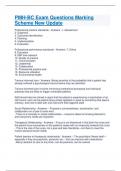PMH-BC Exam Questions Marking
Scheme New Update
Professional practice standards - Answers -1. Assessment
2. Diagnosis
3. Outcomes identification
4. Planning
5. Implementation
6. Evaluation
Professional performance standards - Answers -7. Ethics
8. Education
9. EBP and research
10. Quality of practice
11. Communication
12. Leadership
13. Collaboration
14. Professional practice eval
15. Resource utilization
16. Environmental health
Trauma informed care - Answers -Being sensitive to the probability that a patient has
already suffered a psychological trauma before they are admitted.
Trauma-informed care involves minimizing institutional processes and individual
practices that are likely to trigger vulnerable patients
Staff should also be trained in signs that the patient is experiencing a reactivation of an
old trauma, such as the patient being unduly agitated or upset by something that seems
ordinary, and how to deal with and overcome that triggered state
Social Relationship - Answers -- Purpose is connectedness, socialization, and
collaboration on a task of some kind
- There is a mutuality in social relationships— everyone takes turns being listened to
and everyone's needs are important
Therapeutic Relationship - Answers -- Focus is uni-directional in that both the nurse and
the patient focus exclusively on the patient's needs with no reciprocity towards the nurse
- This is the role of the nurse, not a give and take friendship—not there to meet the
nurse's personal social needs
Patient barriers to therapeutic relationship - Answers -- The psychiatric illness itself—
especially if they are psychotic, paranoid, etc.-- this can improve with medications
- Being resistant to care of any kind—can be paranoia, can be cultural
,- Defense mechanisms—if a patient or family is frightened of mental illness; they may
be in denial and want to discount the severity of the patient's symptoms
Nurse barriers to therapeutic relationship - Answers -- Not being fully focused on the
patient's verbal and nonverbal cues—being distracted or preoccupied
- Countertransference with a particular patient— self-awareness is key, as the nurse,
you must own-up to the impact a patient is having on you and perhaps switch patient
assignments
- Asking patients "why" questions
- Asking patients more than one question at a time
Methods to enhance the therapeutic relationship - Answers -- Maintaining professional
boundaries
- Comfortable eye contact/ empathetic facial expressions
- Engaging patient with gentle, supportive tone of voice
- Keeping a relaxed, open body posture
- Providing the patient with physical comforts such as a blanket or a snack
- Actively listening to what the patient is saying, even if it is indecipherable
- Being fully self-aware
- Using therapeutic silence to allow patient time to reflect and regroup
When was the DSM originally published - Answers -1952
What is the current edition of the DSM? - Answers -DSM-5
When was the DSM-5 published? - Answers -2013
How often do new editions of the DSM get published? - Answers -Every 15-20 years
What is the DSM? - Answers --A handbook used by providers to guide the diagnosing of
psychiatric disorders
-Each includes standardized assessment tools and new diagnoses
-Contains cultural explanations and cultural context for mental health diagnoses
What is stable mental health? - Answers -- Accurately appraise and interpret reality
- Love, experience joy, play, and laugh
- Think clearly, make appropriate decisions, and problem solve
- Control one's behavior and cope with one's thoughts
- Relate to others, form relationships, experience empathy, and manage conflict
constructively
Characteristics of a mental disorder - Answers -- Impairment of brain functioning caused
by neurotransmitter dysfunction, abnormal brain structure, genetic factors, or injury
- There is evidence showing that severe psychological trauma causes physical brain
injury
- Dysfunction in cognition, emotion regulation, or behavior
, - It is usually associated with distress or disability in important activities, relationships, or
occupations
- The inability to cope with life stressors, including job changes, loss of a loved one,
birth of a child, medical challenges, etc.
AIMS (Abnormal Involuntary Movement Scale) - Answers -5 point scale that assess the
presence and severity of abnormal extremity, facial, and body movement
-Higher the score, worse the impairment
-Often result of EPS from first-gen antipsychotics.
BDI (Beck Depression Inventory) - Answers -Multiple choice questionnaire consisting of
21 items
- Used with ages 18-80
- Each item contains 4 rating choices (ranked 0-3
)- A score of 0-9 = no signs of depression; 10-18 mild depression; 19-29 moderate
depression; and 30-63 severe depression
BVC (Broset Violence Checklist) - Answers -a checklist that quickly and easily identifies
the degree of risk a patient has of becoming violent— the higher the score the more
likely they will become violent
CAGE - Answers -a simple 4 question drug/alcohol assessment tool, with each question
scores a 1 if answered yes; a score of even 2 is considered to indicate a substance use
disorder
- C: have you ever felt the need to CUT down on your drinking or drug use?
- A: Have you ever felt ANNOYED by criticism of your drinking or drug use?
- G: Have you ever felt GUILTY about your drinking or drug use?
- E: Have you ever taken alcohol or drugs in the morning as an EYE OPENER, to
steady your nerves, or get rid of a hangover?
CIWA-AR (Clinical Institute Withdrawal Assessment form for Alcohol, Revised) -
Answers -a 10-item tool that assesses typical alcohol withdrawal symptoms, each
symptom is rated on a scale of severity—the higher the score the more severe the
withdrawal
C-SSRS (Columbia-Suicide Severity Rating Scale) - Answers -there are child and adult
versions, and this scale reliably predicts the level of risk of an individual dying by
suicide—the higher the score, the more the patient is at risk
COWS (Clinical Opiate Withdrawal Scales) - Answers -11-item scale that measures the
severity of symptoms during an opiate withdrawal— the higher the score, the worse the
impairment- Score 5-12 = mild; 13-24 = moderate; 25-36 = moderately severe; 36+ =
severe withdrawal




